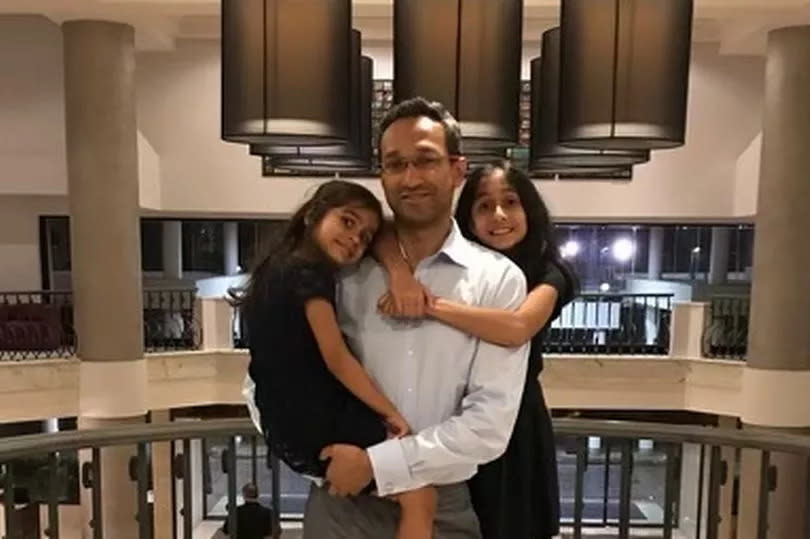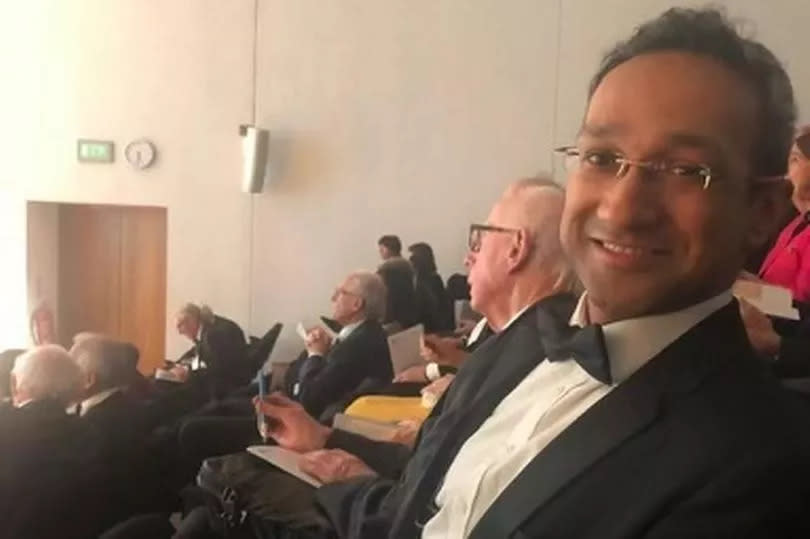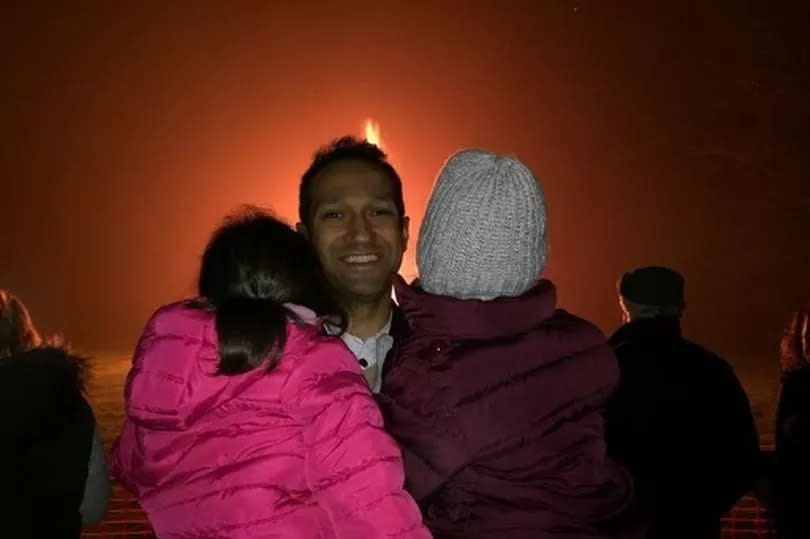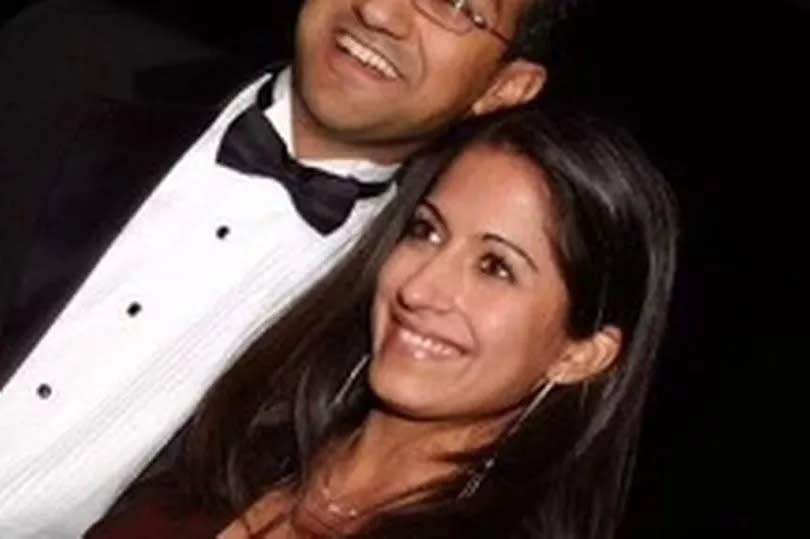Expert was NOT given vital information before recommending surgery that killed beloved doctor and dad-of-two

A national medical expert says she would not have recommended a procedure that was botched and killed a fellow leading professor had she been given vital information about his condition.
Professor Amit Patel, a leading medic at the world-renowned Christie cancer hospital, became gravely ill and his condition was deteriorating rapidly when he was admitted to Wythenshawe Hospital in August 2021.
Medics had scrambled to try and understand the 43-year-old's illness and treat it. However, after a surgical test was recommended to try and diagnose his illness, the botched procedure ended up leaving Professor Patel with less than a 10 per cent chance of survival, and he later died.
READ MORE: 'We've lost control' said clinicians after operation on one of UK's top doctor's was botched
The inquest into the father-of-two's premature death began at Manchester Coroner’s Court on April 4 and was adjourned part-heard until Wednesday (May 1), under coroner Zak Golombek.
The hearing yesterday heard that ahead of the ultimately fatal procedure, test results showed that Professor Patel was also suffering from disseminated intravascular coagulation (DIC). DIC is a serious and rare blood clotting disorder and can cause uncontrollable bleeding.
But Dr Jessica Manson, the consultant rheumatologist who recommended the procedure - and leader of the national-level panel which worked with Wythenshawe Hospital doctors to advise on Professor Patel’s care - told the court she was never informed that he was also suffering from DIC – nor was Professor Patel aware he had the disorder.
The panel met with local clinicians to look at their information and help decide how he should be treated, including recommending the procedure that would ultimately derail his survival. She told the court: “I think we would not have recommended [the procedure] to go ahead had someone had DIC in that moment.”

Dr Manson also shared that she had not been informed by Wythenshawe Hospital doctors that the procedure would only be of ‘low diagnostic yield’ – meaning there was low likelihood that the test would provide the information needed to establish a diagnosis.
“If the person carrying out the procedure said this will have low diagnostic yield, I think I would have not recommended it at that point,” she added. The coroner agreed the panel was ‘not operating on full information’ when it made the recommendation.
The court also heard evidence from Professor Patel’s wife that he, one of the country’s best haematologists, had not been made aware of his DIC status prior to the procedure.
Condition getting worse after August admission
Professor Patel was the first person in the country to be qualified in stem cell transplantation and cellular therapy, and intensive care medicine, and was leading cutting edge medicine at the Christie. He was also a national expert in the life-threatening condition of which he started suffering major symptoms.
But the father-of-two’s condition was deteriorating rapidly after his admission to hospital in August and doctors – including Professor Patel himself – made a ‘working diagnosis’ that he might have been suffering from Still’s disease. Still’s disease is an inflammatory illness, which was causing a potentially deadly immune reaction called HLH.
During his career, Professor Patel had formed ‘national guidance’ on HLH and sat on the national multi-disciplinary panel to which the most serious cases, including his own, were referred. His colleagues on that panel, including Dr Manson, were drafted in to help after being told Prof Patel was in hospital and growing increasingly unwell.
But the court heard how one Wythenshawe Hospital doctor who treated Professor Patel said they had never treated anyone with the condition previously, amid a background of other clinicians telling his family that ‘they had never heard’ of the illness and ‘would read about it’ as Professor Patel was becoming severely ill.
There was strong evidence that his condition was HLH triggered by Still’s disease, but Dr Manson told the court that HLH in adults is most commonly caused by lymphoma, which can be the most devastating driver of the illness. Lymphoma – along with infectious diseases including TB – must be ruled out before any other cause of HLH and that is the ‘standard approach’ to any patient like Professor Patel, Dr Manson said.
Treatment for Still’s disease had also not been working, Professor Patel had been growing worse towards the end of August, and he was moved to intensive care, the court heard.

That national multi-disciplinary panel met, along with Wythenshawe Hospital doctors responsible for his hour-by-hour treatment, to recommend a care plan for Professor Patel based on his presentation and test results. The panel, led by Dr Manson, recommended an endobronchial ultrasound guided biopsy (EBUS), where doctors look inside the lungs to diagnose lung disorders, including inflammation.
The procedure was carried out by Dr Richard Booton, a respiratory consultant at Wythenshawe Hospital. Giving evidence in court, Dr Booton said he shared beliefs ahead of the operation that it would likely not diagnose Professor Patel with lymphoma or TB, in light of a lack of evidence of both.
Still, Dr Booton said he felt the EBUS was the ‘sensible, responsible thing to do’ as the results would ‘be a helpful thing to have’ as Professor Patel’s treatment continued. Dr Booton claims he was under the impression that Wythenshawe Hospital would have passed all relevant information about the patient’s condition to the national panel for them to make recommendations.
Dispute over whether Prof Patel was able to consent
Dr Booton also said he was aware of the patient’s blood disorder before beginning the procedure, but determined the EBUS was still a ‘low risk’ test as the DIC was ‘low grade’.
He also disputes the claim that Professor Patel was not aware of his blood disorder, saying he discussed it with the patient to gain consent before carrying out the test: “I was led to believe he was fully aware of his blood results that morning. I used the phrase low-grade clotting disorder because that’s how it was described to me.”
Professor Patel’s wife, GP Dr Shivani Tanna, has previously claimed in court that her husband was not lucid enough to fully consent to the procedure. Dr Booton has said that the patient was extremely ill, but was responding to the consenting process.

“The EBUS does not take place on September 2 without the recommendation of the MDT,” said the coroner. He then added: “The multi-disciplinary team was not operating on full information, [Dr Manson] would not have recommended an EBUS if she knew Professor Patel had DIC and it was a low yield diagnosis.”
The procedure perforated Professor Patel’s body and his lungs started filling up with blood. Having previously had a more than 75 per cent chance of survival, the likelihood of Prof Patel living fell to just one to 10 per cent, his wife told the court.
She then rushed to hospital to be by his side, finding him ‘coughing up blood’ while doctors told him to ‘lie back’. Dr Tanna said her husband told the doctors ‘if you do, you'll never get the blood out of my lungs’, while Prof Patel informed doctors that his blood was clotting so lying back was unnecessary.
Professor Patel underwent emergency treatment and was transferred to the Manchester Royal Infirmary, but his condition continued to deteriorate until his October 2021 death.
Proceeding.

 Yahoo News
Yahoo News 
